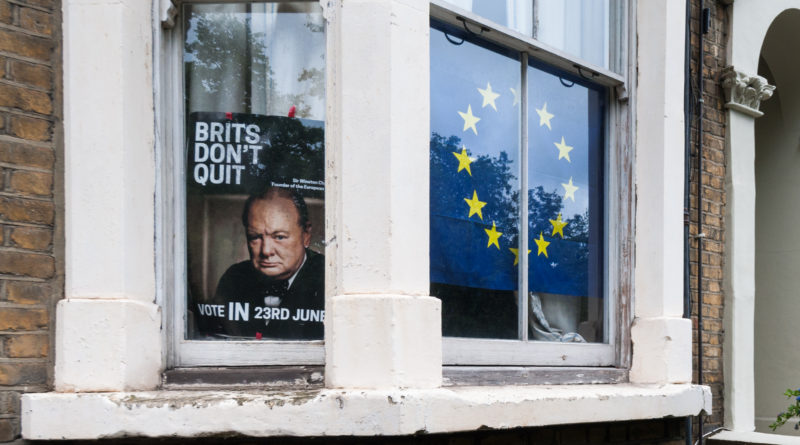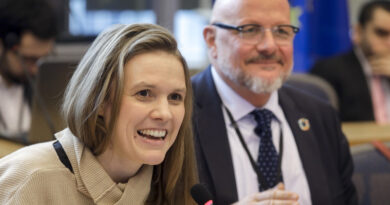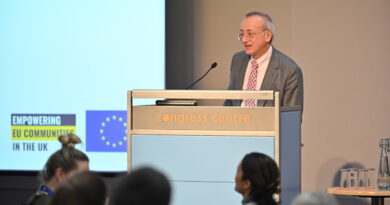The UK’s identity crisis: interview with A. C. Grayling
The British parliament is preparing for one of its most important decisions in recent history. On 11 December, the House of Commons is expected to vote the agreement on the UK withdrawal from the European Union. After two years of negotiations, and a week of heated discussion in Westminster, no one can predict whether the deal will pass and what will happen if it doesn’t. Ahead of the historical vote, Anthony C. Grayling has discussed Brexit and the UK’s future with Europe Street News.
Professor Grayling is a philosopher, author and founder of the New College of the Humanities, an independent institute currently in merger with USA’s Northeastern University. He is also a prominent supporter of the UK in the European Union and of a new vote about it.
What do you think of the withdrawal agreement?
As everybody recognizes, the withdrawal agreement is terrible. It makes us poorer, it gives us no say in the EU and yet, we would have to continue taking EU rules after 29 March 2019. We know that the transition period after Brexit can and would probably have to be extended, so we are looking at 5 years as rule takers as a beginning of what must be 20 years of negotiations. It took 20 years for Switzerland to negotiate its agreement with the EU, and the UK economy is much bigger and more complicated. On the other hand, the no deal option has never had any kind of support in parliament. But this vote is not the end of the story. The fight for a second referendum is gathering momentum and Remain has now the majority in the country. Even if Brexit happens, we will be soon in a transition back in to the EU.
But Brexit is what people voted for…
The support for the European Union is changing. Many people have discovered why they want to be part of it. It is not about being blind about the EU. We see the flaws and difficulties in Brussels: some people believe it is fine to have a two-speed Europe, others believe that the EU is a means to an end leading to the United States of Europe. The sentiment about Europe is polarized, in the UK and the EU. But the UK is increasingly in favour of EU membership. Friends in the EU should understand that we are being taken out of it against the will of the majority. In the referendum, the electorate was restricted: young people, British in Europe, Europeans in the UK did not vote, and only 37% of those who could vote chose to leave. This is 26% of the population only.
In the UK, although there has always been only a small group opposed to the EU, in the far right and in the far left, they have been very vocal. There has also always been an anti-EU narrative in four large circulation newspapers that has been toxic for the country and has made us bad partners in the EU, appearing always to be looking for exceptions and not really being part of the project.
Couldn’t Brexit be seen as an accident of history that has brought to the surface something that has been brewing for a long time?
If we look at Brexit in the perspective of 500 years, we have to go back to the 16th century, when a small country – England – begins to build an empire in the islands and has the very good fortune of being located on the western sea border of Europe at the time Europe becomes powerful and rich. We knew about sailing, and we were poised to take the most advantage of the European growth. Until the 20th century, Britain built an empire on the basis of that fact. After the Second World War, the empire started to be dismantled, but for 200 years every British person thought that they were on top on the world. In the 1970s the British influence had collapsed, but the imperial mindset stuck. In 100 years time, we will look back at this period and we will see three quarters of a century after the end of the empire, when the UK had a terrible struggle about its identity and its place in the world. In the long term, I think the UK will be permanently in the EU because there we have an opportunity to have an influence. In today’s world, the major powers are the USA, China and the EU. The USA and China are still in a 19th-century mindset believing that influence depends on military power. The European Union thinks in terms of soft power, it offers a humane form of capitalism that many in the world are trying to emulate.
Among people supporting the UK remaining in the European Union, there isn’t a lot of discussion of what role the UK should have in the EU. What do you think about it?
Small EU countries like the style of the UK in the EU. Because fundamentally the EU is a market, where everything has to do with playing by the same rules. But there is the question of linguistic and cultural differences, and small countries do not want to be swamped by Germany and France. They want to be able to keep their identity, and the British views allow everyone to keep that internal exceptionalism. In fact what the EU is doing is to create, little by little, more cultural possibilities. In the long term, people will be more literate and agile as Europeans, they will speak more languages, but it will probably take 100 years or more. Over time, Europe can be a confederation of peoples and states where cultural differences are maintained and enjoyed, but the economic base is seamless. The destination is integration with diversity, and this is very noble.
The EU is not just a market, it is also a peace project.
These are the same thing. The founders of the European Union picked up on the fact that to maintain peace, you must have free trade and complete market integration. Countries which are heavily co-dependent economically do not go to war with each other. The internal market was the device to achieve peace after Europe became a land of refugees and cities on fire. Many people think that free movement of people is just going on holiday without a visa. But it is much more than that. Ever since the formation of the single market, many Europeans have come to the UK and contributed to the British economy and society, and no British government has fully applied EU rules by which, for example, you cannot stay more than 3 months in another EU country without a job unless you prove to be self-sufficient. The UK has had more than an open door policy. Now the presence of skilled and reliable workers has caused pockets of disaffection and Leave voters felt they could not compete. And yet, consistently two thirds of the British people – 63% – say they approve of free movement. Within the 37% of UK voters who voted Leave, there are many different groups: some voted to leave because they wanted more money for the National Health Service, some for sovereignty, some for free movement. If we focus only on being anti-immigration, this is a small group, and probably the same size of people having similar views in France, Italy, Germany and the Netherlands.
So how did the referendum result come about?
Most people thought Remain would win easily, many did not vote for that reason. There were lies and false promises by the Leave campaign, and the Electoral Commission has discovered crimes and fraud in the Leave campaigns’ funding. There was a targeted use of social media aimed at the small swing-voter group who could be tempted to vote Leave and who made the difference between the two blocs of people who had already made up their minds. Many of these people were persuaded that the EU could be blamed for problems in fact caused by the British government, mainly austerity policies. There are also questions about constitutional legitimacy. Constitutional morality requires consistency and clarity. Now, the trade union legislation says that when unions decide a strike, ballots have to reach at least 50% of eligible members and 40% of all eligible members must support the action for it to be legal. To trigger a new general election, 66% of members of parliament must agree. But we are allowing 37% of the UK electorate to decide on something of the proportions of Brexit. This constitutional disorder is nauseating.
The referendum as a tool to make decisions is not even in the British political tradition.
No, it is not in the British tradition. We have had only five major referendums: in 1975 [on EU membership], in 1979 [on the devolution of powers to the regions], in 2011 [on the election of MPs], in 2014 [on Scotland’s independence] and in 2016 [on EU membership again]. Each one has been held on a different basis, with different constituencies and with or without minimum thresholds. With the 2016 referendum we have given up on our representative democracy, in which decisions are meant to be made by parliament.
But you support a new referendum. What do you say to people who voted for Brexit?
With all the facts coming in, a new vote would allow a decision based on a well-informed majority. We have to clear the air and everyone affected, including British residents in the EU and European nationals in the UK, must have a say. If people were to decide to stay in the EU, the democratic result should be accepted. And the same if people were to decide to leave. The message to Europe is that it is a good thing if the UK gets out of this misleading dream. Then we must look forward to be real partners and contribute to the project.
Claudia Delpero © all rights reserved.
Photo: London, EU referendum campaign 2016. By Maciek Musialek © European Union, 2016. Source: EC – Audiovisual Service.




